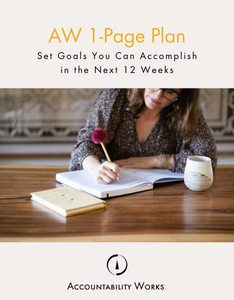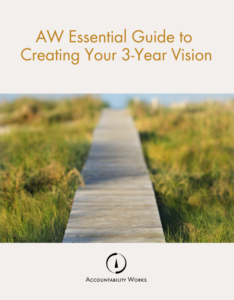Here is how I arrived at planning ahead. As an accountability coach, I quickly realized you can’t successfully decide what you are going to get done without a clear idea of what you are already committed to.
If you aren’t planning ahead for your most important priorities, then they aren’t in your calendar or planner. Then if someone wants to meet you or asks you to do something you appear to be free. Once you realize your day is taken up with meetings, obligations, and errands and there is no time to do the real work that’s most important, you end up feeling frustrated and unaccomplished.
At Accountability Works, we set goals every quarter. Then every single week we make commitments (you can think of these as action items or homework for the week) that need to be completed by the next meeting. For a long time, I would get my commitments done when there was time. Fitting them around coaching calls and work meetings if they were business-related or in the early mornings, evenings and weekends if they were personal.
However, I would inevitably have one or two commitments I was finishing at the last minute. Now if you’ve taken our procrastination quiz, and identified as a performer, you will know what I’m talking about. Accountability is great because performers will get things done when they know they have to show up for others but they typically get it done at the last minute. They may not enjoy the rush but they are certainly used to it.
A few years ago, I realized this was something I was ready to let go of. So now planning ahead is much easier because I do the following:
- Put all the important dates – personal, professional, family, school, holidays in my calendar for the year.
- Set goals for the year and for each quarter (this of course is part of our program but even if you aren’t a client, this is a good way of saying this is what I’m focused on now, which lends itself to saying no to things that are not your current priorities)
- Plan my month ahead. I usually do this at the end of the month prior month or beginning of the current month depending on what day of the week it falls because I like to plan on Sundays which is my slowest most leisurely day of the week.
- Make a commitment every week to plan my week ahead and to put my commitments in my schedule. That means I make appointments with myself for when I’m going to do things. This way that time shows as busy. It also means that sometimes I have grand ideas of what I want to get done that week but I have to reconcile that with what I’m already obligated to do and scale back.
- Stay mindful of free time. I know that stress is a trigger for my health so even though I may want to fill up my time, I know that I need buffers to recharge.
- Put my lunch on my calendar. Before I started doing this I was notorious for working through lunch or eating at my desk. This has created much better eating habits and feeds my desire to be more mindful.
- When things don’t go according to plan, I don’t freak out or beat myself up. The practice of planning is just that, a practice and you get better at it over time.
When I’m planning ahead everything goes into my computer so I get reminders and since people can schedule meetings with me online, it ensures I keep my availability accurate. I also keep my AW Planner open on my desk and write notes and check off commitments all week long. Writing things down creates a memory that putting something in my online calendar does not. It might sound a little tedious but the whole process takes me about 15 minutes on Sunday morning and leads to a much more relaxed week.



